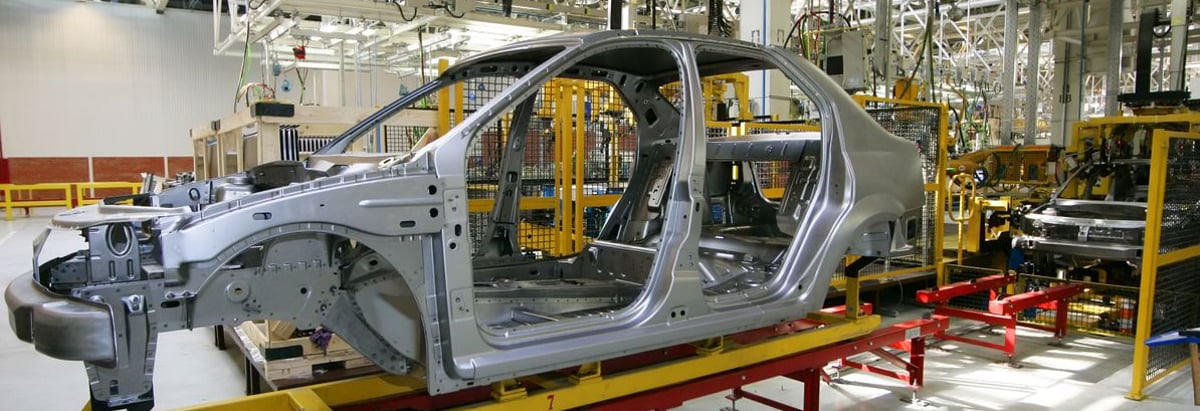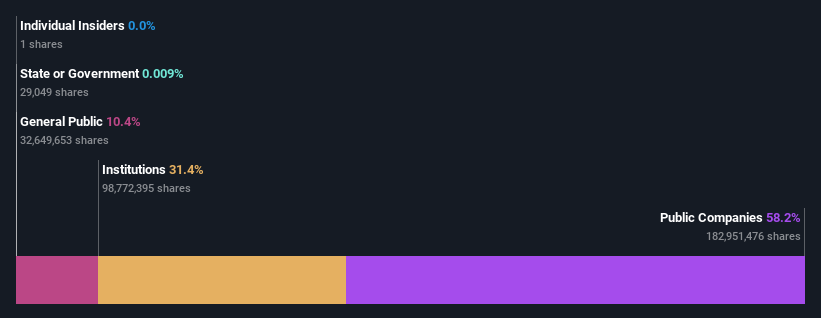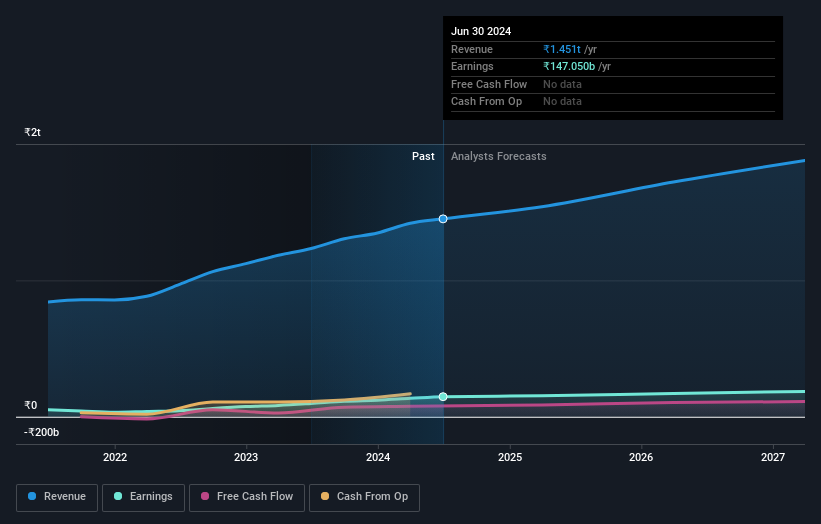Public companies account for 58% of Maruti Suzuki India Limited's (NSE:MARUTI) ownership, while institutions account for 31%

Key Insights
- The considerable ownership by public companies in Maruti Suzuki India indicates that they collectively have a greater say in management and business strategy
- The largest shareholder of the company is Suzuki Motor Corporation with a 58% stake
- Institutional ownership in Maruti Suzuki India is 31%
A look at the shareholders of Maruti Suzuki India Limited (NSE:MARUTI) can tell us which group is most powerful. And the group that holds the biggest piece of the pie are public companies with 58% ownership. Put another way, the group faces the maximum upside potential (or downside risk).
Meanwhile, institutions make up 31% of the company’s shareholders. Generally speaking, as a company grows, institutions will increase their ownership. Conversely, insiders often decrease their ownership over time.
Let's take a closer look to see what the different types of shareholders can tell us about Maruti Suzuki India.
Check out our latest analysis for Maruti Suzuki India

What Does The Institutional Ownership Tell Us About Maruti Suzuki India?
Institutional investors commonly compare their own returns to the returns of a commonly followed index. So they generally do consider buying larger companies that are included in the relevant benchmark index.
As you can see, institutional investors have a fair amount of stake in Maruti Suzuki India. This can indicate that the company has a certain degree of credibility in the investment community. However, it is best to be wary of relying on the supposed validation that comes with institutional investors. They too, get it wrong sometimes. If multiple institutions change their view on a stock at the same time, you could see the share price drop fast. It's therefore worth looking at Maruti Suzuki India's earnings history below. Of course, the future is what really matters.

We note that hedge funds don't have a meaningful investment in Maruti Suzuki India. Suzuki Motor Corporation is currently the company's largest shareholder with 58% of shares outstanding. This implies that they have majority interest control of the future of the company. In comparison, the second and third largest shareholders hold about 3.9% and 2.6% of the stock.
While it makes sense to study institutional ownership data for a company, it also makes sense to study analyst sentiments to know which way the wind is blowing. Quite a few analysts cover the stock, so you could look into forecast growth quite easily.
Insider Ownership Of Maruti Suzuki India
While the precise definition of an insider can be subjective, almost everyone considers board members to be insiders. The company management answer to the board and the latter should represent the interests of shareholders. Notably, sometimes top-level managers are on the board themselves.
I generally consider insider ownership to be a good thing. However, on some occasions it makes it more difficult for other shareholders to hold the board accountable for decisions.
Our data suggests that insiders own under 1% of Maruti Suzuki India Limited in their own names. Being so large, we would not expect insiders to own a large proportion of the stock. Collectively, they own ₹13k of stock. It is good to see board members owning shares, but it might be worth checking if those insiders have been buying.
General Public Ownership
With a 10% ownership, the general public, mostly comprising of individual investors, have some degree of sway over Maruti Suzuki India. While this group can't necessarily call the shots, it can certainly have a real influence on how the company is run.
Public Company Ownership
We can see that public companies hold 58% of the Maruti Suzuki India shares on issue. It's hard to say for sure but this suggests they have entwined business interests. This might be a strategic stake, so it's worth watching this space for changes in ownership.
Next Steps:
I find it very interesting to look at who exactly owns a company. But to truly gain insight, we need to consider other information, too. To that end, you should be aware of the 2 warning signs we've spotted with Maruti Suzuki India .
Ultimately the future is most important. You can access this free report on analyst forecasts for the company.
NB: Figures in this article are calculated using data from the last twelve months, which refer to the 12-month period ending on the last date of the month the financial statement is dated. This may not be consistent with full year annual report figures.
New: Manage All Your Stock Portfolios in One Place
We've created the ultimate portfolio companion for stock investors, and it's free.
• Connect an unlimited number of Portfolios and see your total in one currency
• Be alerted to new Warning Signs or Risks via email or mobile
• Track the Fair Value of your stocks
Have feedback on this article? Concerned about the content? Get in touch with us directly. Alternatively, email editorial-team (at) simplywallst.com.
This article by Simply Wall St is general in nature. We provide commentary based on historical data and analyst forecasts only using an unbiased methodology and our articles are not intended to be financial advice. It does not constitute a recommendation to buy or sell any stock, and does not take account of your objectives, or your financial situation. We aim to bring you long-term focused analysis driven by fundamental data. Note that our analysis may not factor in the latest price-sensitive company announcements or qualitative material. Simply Wall St has no position in any stocks mentioned.
About NSEI:MARUTI
Maruti Suzuki India
Engages in the manufacture, purchase, and sale of motor vehicles, components, and spare parts primarily in India.
Excellent balance sheet average dividend payer.
Similar Companies
Market Insights
Community Narratives


